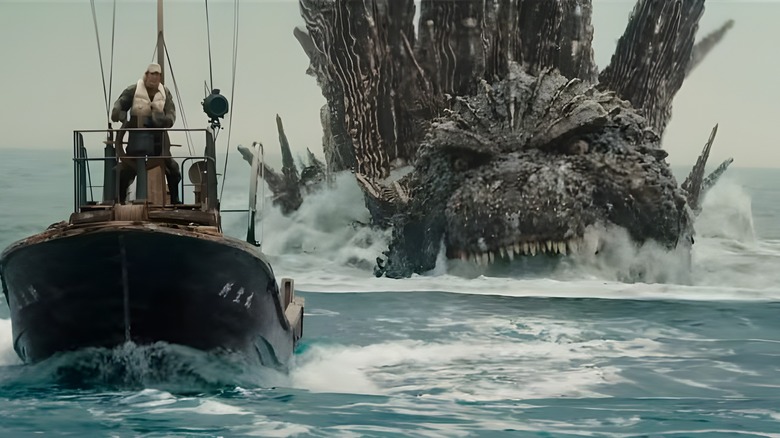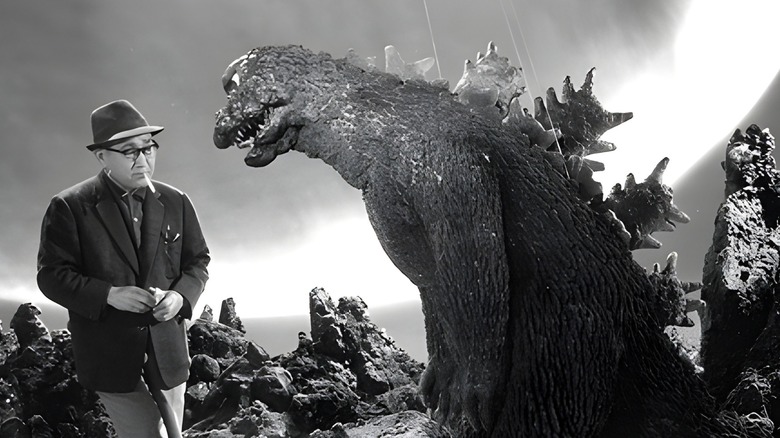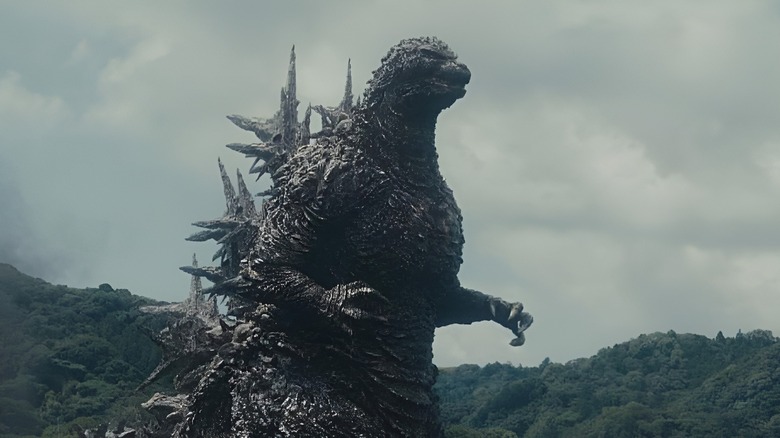Godzilla Minus One Just Made Oscar History After 70 Years Of Kaiju Films
It's a good time to be a Godzilla fan.
After 38 films and 70 years of city-smashing, monster-fighting spectacle, the Godzilla franchise has achieved a once unimaginable accomplishment with 2023's "Godzilla Minus One" receiving an Academy Award nomination for best visual effects. Not only is "Minus One" the first Godzilla movie — Japanese or American — to reach this milestone, but it is also the first Japanese-language film in history to earn a nomination in this prestigious category.
"Godzilla Minus One" is a standout Oscars entry in a year of predictable choices and frustrating snubs. While the film will be up against some tough competition with such blockbusters as "The Creator," "Guardians of the Galaxy Vol. 3," "Mission: Impossible – Dead Reckoning Part One," and "Napoleon," few of these entries' visual effects serve a story that sports as much raw power and rich emotion as "Minus One." We have some time before seeing whether the movie stomps out its challengers, but until then, let's dive into why Godzilla's first-ever Oscar nomination is such a significant achievement.
Godzilla Minus One is a testament to the genius of tokusatsu filmmaking
1954's "Godzilla" was a game-changer for the film industry. Up to that point, mainstream monster movies were a dime a dozen and often required the use of elaborate techniques to bring them to life, such as the intricate stop-motion effects of 1933's "King Kong." While suits had been seen now and then, it wouldn't be until the release of "Godzilla" that this craft was elevated to a new art form, commonly referred to as tokusatsu. And while "Godzilla Minus One" has embraced the modern era of visual effects technology, it nevertheless harbors the same spirit of classic kaiju cinema.
Japanese filmmakers have historically worked with smaller budgets than their American counterparts. As a result, effects artists such as Eiji Tsuburaya, who worked on many of the Showa era Godzilla movies along with creating the "Ultraman" franchise, were forced to make the best with what they had. Whereas Hollywood productions often throw money at their problems, these craftsmen relied on a level of creativity and ingenuity that came alive in their work. Tricks as simple as lowering the frame rate and utilizing creative camera and lighting angles did more than enough to give the monsters and their miniature environments a rich sense of atmosphere.
With a budget of $15 million (and potentially less according to some reports), "Godzilla Minus One" stands out from the crowd, with the second lowest budget within its Oscar category being "The Creator" at $80 million. It's a staggering achievement, to say the least, and proof that a film's effects should not be judged by their perfection, but by the collective creativity, hard work, and artistry that went into making them.
Godzilla's time in the spotlight is long overdue (but nevertheless validating for fans)
The stunning special effects of "Godzilla Minus One" would be nothing if it wasn't in service of an overall fantastic film. But this time around, fans haven't been the only ones singing the movie's praises. With its lovable and well-acted cast of characters, tense action, and rich symbolism, "Minus One" has become a worldwide phenomenon. It has earned critical acclaim across the board, become the highest-grossing Japanese Godzilla film, and has been touted as one of 2023's best, with many even claiming it to be better than countless Hollywood blockbusters from the same year.
While it's taken the Oscars seven decades to acknowledge this phenomenal franchise, plenty of other awards ceremonies have sung its praises over the years. Since its establishing in 1978, the Japan Academy Awards have been no stranger to awarding Godzilla films. Several entries including "Godzilla 1985," "Godzilla vs. King Ghidorah," "Godzilla vs. Destroyah," and "Shin Godzilla" have been nominated for or taken home prestigious awards from this event, with the latter even winning best picture. Godzilla even won an MTV Lifetime Achievement Award in 1996, making him one of the few fictional characters to take home the honor alongside figures such as Chewbacca and Jason Voorhees.
By taking risks and showing its inventiveness, "Godzilla Minus One" has helped the franchise receive its long overdue respect from the mainstream, a feat that not even America's MonsterVerse films have quite achieved. Whether or not it takes home the gold, the true victory of "Minus One" is getting a new generation of moviegoers hooked on this legendary screen icon.


